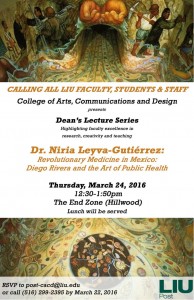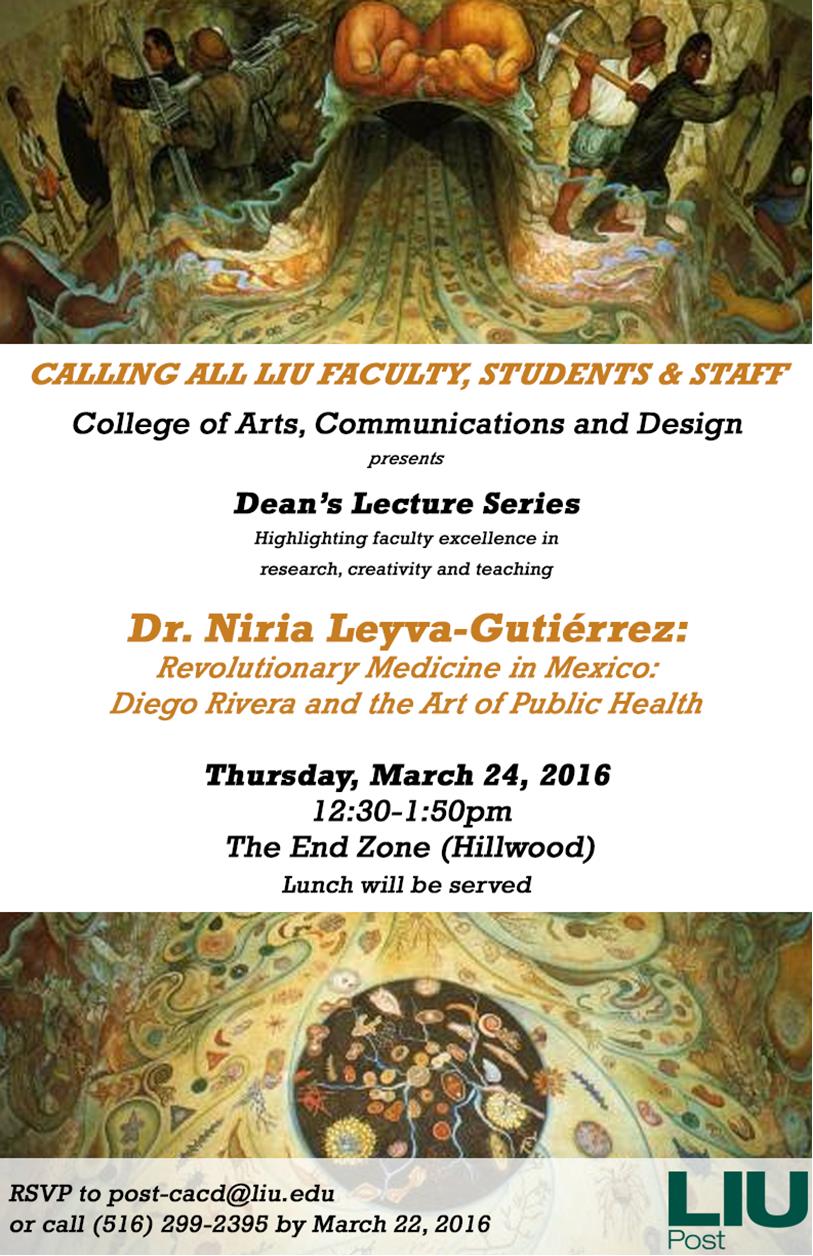By Thomas Gillen
Niria Leyva-Gutierrez, an assistant professor of art history and museum studies, will host the latest chapter in the Dean’s Lecture Series presented by the College of Arts, Communications and Design on Thursday, April 7 during common hour. Her lecture is titled “Revolutionary Medicine in Mexico: Diego Rivera and the Art of Public Health.”
Leyva-Gutierrez explained that her research on Diego Rivera originated when she was a graduate student. “I started researching this topic as a graduate student many years ago and have recently revisited after conducting more research on the subject and realizing that very little has been written in the art historical literature on this topic,” Leyva-Gutierrez said. “Diego Rivera’s murals have been examined from a multitude of perspectives, but this is an important area that merits more research and interpretation. This is why I have chosen to continue exploring it.” During the Spring 2016 semester, Leyva-Gutierrez is currently teaching ART 1, Introduction to Visual Arts; ART 60, Survey of World Art 2; and ART 590, Graduate Projects.
The lecture is based on Dr. Leyva-Gutierrez’s current research “which looks at the intersection between art and medicine. Specifically, I will be discussing public health campaigns in Mexico and the work of the famous muralist, Diego Rivera,” Leyva-Gutierrez said. Throughout Diego Rivera’s artistic career, he made several paintings exploring the themes of medicine and surgery. “Rivera’s first surgical theme can be traced to 1920, when he attended and drew the wonders of the surgical operation of Dr. Faure in Paris. The artist was particularly moved by surgical and medical events, and this surgical clinic enhanced his appetite for these important professional activities,” according to Luis Toledo Pereyra, an adjunct professor from the Western Michigan University Department of History, from the article “Diego Rivera and his extraordinary art of medicine and surgery” on the US National Library of Medicine National Institutes of Health website.
Other works by Diego Rivera include “A History of Medicine,” “The Detroit Industry Fresco Cycle,” and “Dream of a Sunday Afternoon in Alameda Park.” According to TheArtStory.com, “The Detroit Industry Fresco Cycle” uses Aztec culture to show how medicine can be both beneficial and harmful to society, through the use of vaccines and lethal gas.
Levya-Gutierrez also explained where her research on Diego Rivera originally developed. “This research developed out of a paper I wrote about anti-clericalism and anti-clerical imagery produced in Mexico during and after the Mexican Revolution,” Leyva-Gutierrez stated. “What I came to realize during my research was that Rivera’s anti-clerical sentiment was in part informed by his commitment to the idea of modern medicine and universal healthcare. For Rivera, his promotion of science was a clear way of undermining the Catholic Church and, as he wrote, its ‘fanciful superstitions.’
The goal of the Dean’s Lecture Series is “to give faculty a venue to present their scholarly and artistic work, to give students and other faculty the opportunity to better understand the interests and passions of others, and to stimulate the academic environment of our campus by providing a place for dialogue and debate on important and artistic topics,” according to Noel Zahler, the Dean of the College of Arts, Communications and Design, formerly known as the School of Visual and Performing Arts. The College has presented the Dean’s Lecture Series for the last two years and tries to present three each semester, according to Dean Zahler. “I don’t believe that students really understand how distinguished our faculty are,” Zahler stated. “All of them are much more than classroom instructors. They pursue scholarly research and artistic creativity as part of their lives. These lectures are ‘a peek behind the curtain.”
Leyva-Gutierrez explained why students should attend this lecture. “This work is original research presented at Post for the first time and students should attend the lecture since it will offer an opportunity to see some of the most fascinating, yet neglected murals by this artist within the context of public health and medicine in Mexico.” The lecture will be held on Thursday, April 7, in The End Zone in Hillwood Commons from 12:30-1:50 p.m.
To reserve a seat, email post-cacd@liu.edu or call 516-299-2395.




Be First to Comment